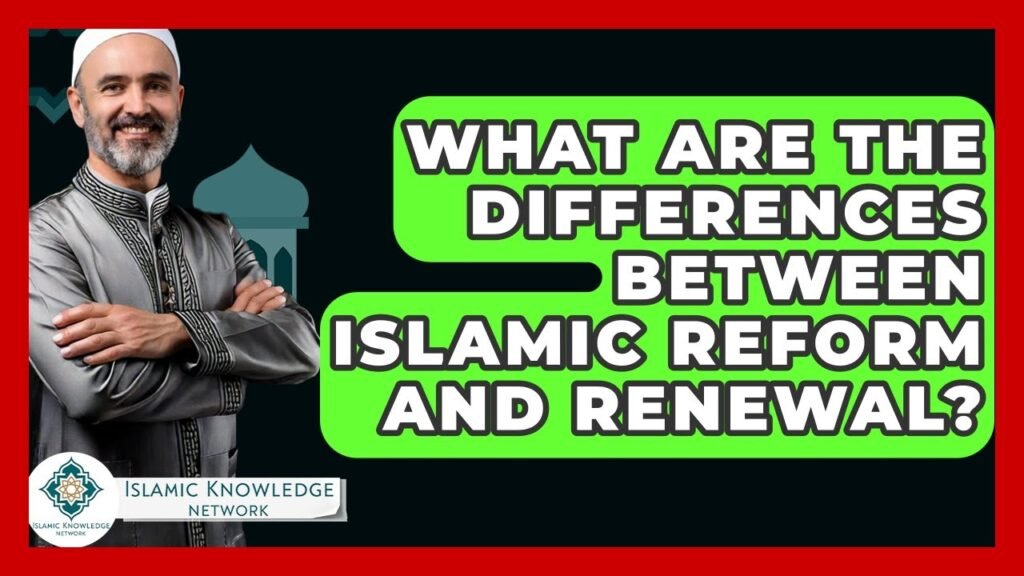Disclaimer:
The content published on this website is provided for general informational purposes only. Articles are generated with the assistance of artificial intelligence and are reviewed periodically; however, accuracy cannot be guaranteed in all cases. Readers are encouraged to verify important information from reliable and authoritative sources before relying on it. The website does not intend to mislead, and any errors found will be corrected when identified.
In the vast landscape of Islamic thought, the terms “reform” and “renewal” often surface, each carrying distinct connotations and implications for the faith. Understanding these differences is crucial for Muslims and scholars alike, as they reflect varying approaches to contemporary challenges and the evolving dynamics of society. While reform may suggest a re-examination and modification of existing beliefs and practices, renewal emphasizes a revival of authentic Islamic principles in light of modern realities. This nuanced exploration sheds light on how these movements are shaping the future of Islam and addressing the needs of the ummah in a rapidly changing world.
At Airlink Hajj and Umrah, we believe in fostering a deeper understanding of such pivotal topics within the Islamic community. This discourse on Islamic reform and renewal not only enhances your knowledge but also engages you in meaningful conversations about the faith’s journey through time. As we strive to keep our readers informed, our blog is dedicated to providing the latest updates on Hajj and Umrah, ensuring you have all the necessary information to enrich your pilgrimage experience. Join us as we delve into the distinctions between these two vital concepts, exploring their implications for the practice of Islam today.
What Are the Key Differences Between Islamic Reform and Renewal?
When exploring the landscape of contemporary Islam, the concepts of reform and renewal often surface. While both terms signify change, they address different aspects of Islamic practice and thought. Islamic reform typically aims to address perceived issues within traditional practices, seeking to reinterpret or modernize those practices according to contemporary values. Reformists often advocate for a more critical and progressive understanding of Islamic law and ethics, focusing on aligning the faith’s teachings with modern human rights and societal norms.
In contrast, Islamic renewal emphasizes returning to the core principles of Islam, often with a focus on spirituality, ethics, and community. Renewers encourage Muslims to reconnect with the foundational texts and teachings of their faith rather than seeking significant reinterpretation. This approach frequently highlights traditional values and aims to purify beliefs and practices from perceived modern corruptions.
Understanding these differences is vital for Muslims navigating their faith in today’s world. At airlinkhajjandumrah.com, we provide updates on Hajj and Umrah to support your spiritual journey, offering insights that resonate with both reformist and renewal perspectives. Stay informed through our blog for the latest in Islamic practices and pilgrimage experiences!
FAQ on “What Are the Key Differences Between Islamic Reform and Renewal?”
FAQs on Key Differences Between Islamic Reform and Renewal
1. What is the primary focus of Islamic reform?
Islamic reform primarily aims to address and modify specific practices and interpretations of Islamic teachings that are perceived as outdated or problematic, often seeking to align them more closely with contemporary values.
2. How does Islamic renewal differ from reform?
Islamic renewal emphasizes rejuvenating the spiritual and ethical dimensions of Islam, seeking to revitalize personal faith and community practice, rather than altering established doctrines or practices.
3. Are Islamic reform and renewal movements always in conflict?
Not necessarily. While they have different focuses, reform and renewal can complement each other. Some movements advocate for both reforming practices and renewing spiritual engagement simultaneously.
4. Who are the key figures associated with Islamic reform?
Key figures in Islamic reform include thinkers like Jamal al-Din al-Afghani and Muhammad Abduh, who sought to modernize Islamic thought and practice in response to colonialism and contemporary challenges.
5. Can Islamic reform and renewal contribute to social change?
Yes, both movements can significantly contribute to social change. Reform can address institutional issues, while renewal can inspire grassroots movements and personal transformation, encouraging a more engaged and responsive Muslim community.
Mushu, an experienced Saudi Arabia traveler and writer, shares insightful tips and spiritual reflections to enhance Hajj and Umrah journeys for fellow pilgrims. He has been to Makkah and Madina from 2016 to 2023 many times and his posts will reflect this.







